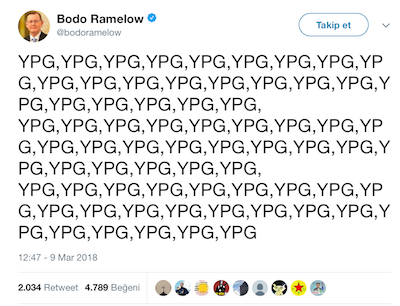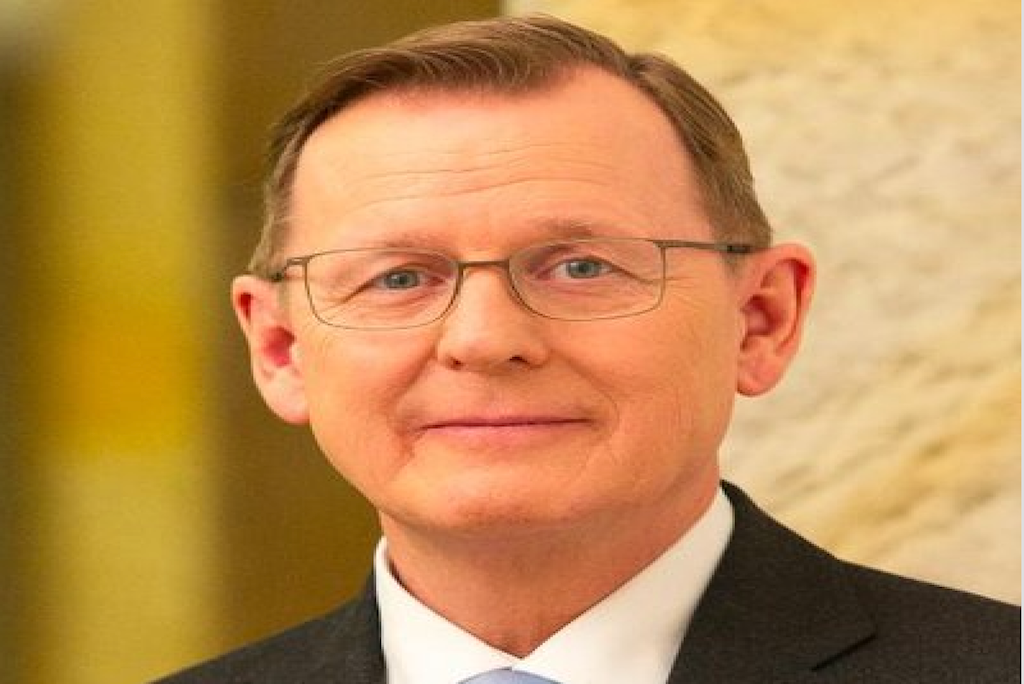Bodo Ramelow, the prime minister of Germany’s federal state of Thuringia, which has a population of almost 2.5 million, said he has been receiving death threats following a tweet supporting the People’s Protection (Units YPG) Kurdish forces in Syria.
The German politician said that after his tweet, some Twitter users sent him messages saying, “There is space available in the coffins” and “They will shoot you in the head.”

Romelow received death threats from Turkish Twitter users ranging from remarks such as “There is still room in the coffins” to threatened head shots, Ramelow said.
Romelow says that he received posts with inappropriate content, including photoshopped images of his wife, that were sent from Turkey and Germany. The German politician notified Twitter, and the tweets were deleted.
Hundreds of tweets reacting to Ramelow can be found on Twitter, including a tweet posted by a user containing images of Turkish special forces saying, “We are coming.”
Romelow today once again posted a tweet about Turkey’s military offensive in Afrin. Responding to another tweet, Romelow called for peace in Afrin, saying, “Stop the aggressor.” Ramelow also expressed his solidarity with the Kurds in further tweets: “Afrin stands for self-determination. And any attack by a NATO partner I perceive as a blow to our values and our freedom! It is the open breach of international law! Solidarity with Afrin!”
Meanwhile, supporters of YPG/Kurdistan Workers’ Party (PKK) reportedly attacked Turkish passengers on Sunday at an airport in western Germany, local media reported. During an unauthorized demonstration at Dusseldorf airport the protesters unfurled banners and chanted slogans.
At least 10 people were injured as police intervened, spraying pepper gas to disperse the protesters. According to a statement by the police, only a section of the waiting area was affected by the incident and there was no disruption of flights.
Also on Sunday the controversial Turkish-Islamic Union for Religious Affairs (DİTİB), which has close ties to the regime of Turkey’s autocratic President Erdoğan, called on German authorities to do more to protect Muslims and their places of worship. The appeal comes after several suspected attacks on mosques and Muslim centers.
A suspected arson attack on a Berlin mosque on Sunday night was the 24th time in some two months that a mosque in Germany had been deliberately targeted, DİTİB said in a press statement. DİTİB called on German authorities to ensure that Muslim places of worship were protected, to find out who was behind attacks as quickly as possible and to bring those responsible to justice.
It warned that it was “a question of time” before someone was injured and accused German politicians and society of remaining silent about the everyday discrimination and attacks directed against Muslims. DİTİB said such public silence was seen by far-right extremists and “branches of foreign terrorist groups” as tacit toleration of their acts.
Police said a mosque in Berlin’s Reinickendorf district was probably set on fire by three teenagers. No one was injured in the blaze, but the group running the mosque said the entire interior of the building was destroyed.
According to a report by Deutsche Welle (DW), in separate incidents, firebombs were thrown at a Turkish immigrants association in the western town of Meschede, also on Sunday, and at a mosque in Lauffen, in southern Germany, on Friday. No one was injured in those attacks, which are still under investigation.
Germany’s Interior Ministry recently released figures showing that some 950 anti-Muslim acts had been carried out in Germany in 2017. Many of those crimes were committed by far-right elements. German police are also looking at possible political motives behind the latest mosque attacks, amid rising anger among the Kurdish community at the Turkish military offensive against the Kurdish-held Afrin region of northern Syria.















